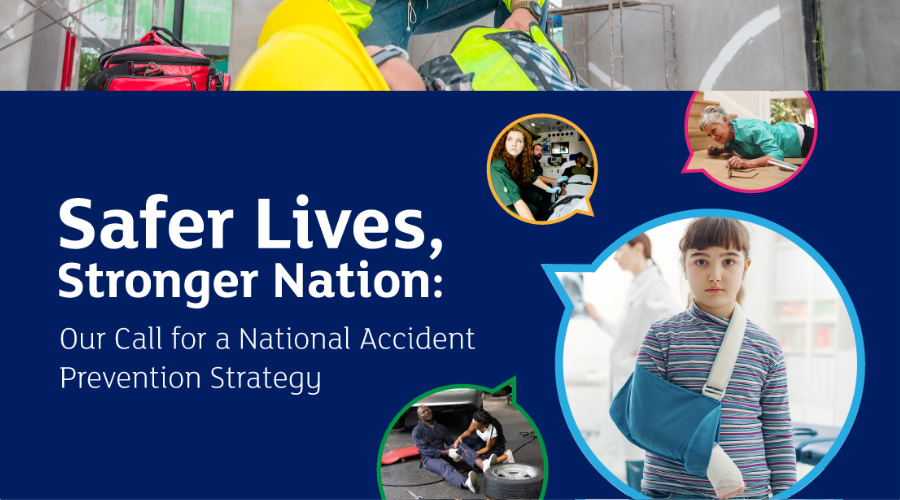Every year, preventable accidents claim thousands of lives across the UK. The Royal Society for the Prevention of Accidents (RoSPA) has launched the ‘Safer Lives, Stronger Nation’ campaign to urge the government to take decisive action and introduce a UK-wide National Accident Prevention Strategy. With accident-related deaths on the rise, urgent intervention is required to reduce unnecessary loss of life and the immense economic burden accidents impose on the nation.
The stark reality: the rising toll of preventable accidents
Over the past decade, accidental death rates have surged by 42%, with 21,336 people losing their lives in 2022, enough to fill London’s O2 Arena.
- Accidents remain the leading cause of preventable death in people under 40.
- Around 840,000 people were admitted to UK hospitals in 2022/3 due to accidents, accounting for 5.2 million bed days.
- 7 million people attended A&E for accident-related injuries.
- The economic impact is staggering, costing the NHS at least £6 billion annually (figure that excludes surgery and community care expenses).
- The UK loses 29 million working days per year due to accidents, resulting in £12 billion in economic costs.
Chapter 4 of the report
Workplace accidents: a heavy burden on businesses and the economy
Accidents at work contribute significantly to the overall crisis. Workplace injuries and fatalities impose substantial human and economic costs on workers, businesses, and the broader economy.
- Over 100 workplace fatalities occur annually in the UK.
- The most dangerous industries include:
- Construction (37% of fatal accidents)
- Agriculture, forestry, and fisheries (17%)
- 561,000 people are injured at work every year in Great Britain.
- Workplace injuries lead to 3.7 million lost working days annually and cost the UK £7.7 billion.
- The Health and Safety Executive (HSE) estimates that for every £100 recovered from insurers, businesses face up to £3,600 in uninsured costs.
- Work-related ill health, including stress, depression, and musculoskeletal disorders, contributed to a further 31 million lost working days in 2022/3.
- Accidents at work led to 37% more lost days than strikes in 2023.
Emerging trends in accidents in the workplace
The report highlights several emerging trends that are reshaping workplace health and safety in the UK. As the nature of work evolves, new risks are emerging that require targeted interventions and updated safety strategies. Below, we explore key challenges that must be addressed to protect workers and prevent accidents.
- Gig economy
- Driving or riding for work
- Health and safety skills in a dynamic workforce
- Mental health
- Diversity
Gig Economy
The rise of the gig economy has transformed the UK’s workforce, with millions of workers engaged in flexible jobs across industries like delivery, transport, and IT. This shift has created significant risks, particularly regarding workplace safety. These workers often operate in high-risk environments, cycling or driving long hours, frequently under financial pressure to work extended shifts.
In 2023, over half of gig workers earned below minimum wage, with many facing exhaustion, increasing the likelihood of accidents.
A key concern the report highlights is the ambiguous employment status of gig workers, who often lack traditional protections like sick pay, minimum wage guarantees, and employer-provided safety equipment.
While the Supreme Court ruled in 2021 that Uber drivers qualify as workers with rights, enforcement remains inconsistent. The Health and Safety Executive (HSE) has extended PPE requirements to gig workers, but broader protections are still lacking.
Recommendations within the report:
- Conduct a study assessing the scale and nature of the ‘gig’ economy and the conditions of its workers; use this to inform a strategic approach to health and safety.
- Ensure that all ‘gig’ workers are eligible for compensation for work-related accidents and occupational diseases.
- Give ‘gig’ workers the right to good working conditions, a minimum wage and union representation.
- Ratify International Labour Organisation conventions aimed at protecting workers’ safety, including the 1981 Occupational Safety and Health Convention (No. 155) and the 2023 Safe and Healthy Working Environment Convention (No.191).
Driving or riding for work
Driving is the most hazardous work activity in the UK, contributing to more accidental deaths and serious injuries than any other workplace task. Many workers, from delivery drivers to emergency responders, spend hours on the road, often under pressure to meet deadlines. The Health and Safety Executive (HSE) estimates that up to a quarter of all road traffic incidents involve someone driving for work, with over 500 fatalities and 5,000 serious injuries annually.
Despite this, work-related driving incidents are not required to be reported under RIDDOR regulations, meaning crucial data on causes and trends is lacking. This underreporting limits employers’ ability to improve safety and weakens the case for targeted policy interventions.
RoSPA is calling for better reporting and data collection on work-related driving incidents, ensuring that employers and policymakers have the insights needed to reduce preventable deaths and injuries on UK roads.
Recommendations within the report:
- Make work-related driving incidents RIDDOR reportable.
Recommendations specifically regarding gig workers:
- Government needs to understand road collision rates among gig economy drivers.
- Government should assess protections on gig economy workers to ensure that they are covered by health and safety regulations while riding or driving for work.
Commuting
Commuting remains a blind spot in workplace health and safety, as incidents occurring while employees travel to work are not RIDDOR-reportable and fall outside employer responsibilities.
Recommendations regarding commuters:
- Target campaigns aimed at both employers and those likely to drive drowsy, incorporating working with stakeholders to manage the risk factors.
- Encourage employers to support workers who drive, for instance through improved shift planning, night worker assessments, and offering overnight stays.
Health and Safety skills in a dynamic workforce
The UK workforce is becoming increasingly dynamic, with millennials and Gen Z workers embracing job-hopping and multiple career changes. While this flexibility benefits the economy, it also presents serious health and safety challenges, as frequent job transitions can lead to gaps in essential safety knowledge.
In the past, long-term employment in a single industry helped maintain safety expertise, but today’s rising job turnover makes a universal approach to health and safety training essential.
Recommendations within the report
• Sector Skills Councils to establish transferable health and safety ‘fundamentals’ qualifications, tools, and funding.
Mental Health
Mental health issues are on the rise, with one in four adults in England experiencing a diagnosable mental health problem annually, most commonly depression and anxiety.
Work-related stress is a key contributor, with stress, depression, and anxiety accounting for 49% of long-term work-related health issues in 2022/23, leading to over 17 million lost working days and costing the UK economy £177 billion.
Poor workplace management exacerbates the issue. Workers who rate their managers’ people skills poorly are 3.5 times more likely to report work negatively affecting their mental health. Yet, only 44% of businesses provide mental health training for managers, leaving many employees unsupported.
Employers have a legal duty to protect workers from work-related stress, but without proper training and risk assessments, interventions may be ineffective.
Recommendations within the report:
- Workers should have universal access to Occupational Health Practitioners
- HSE should review its HSE Stress Management Standards and then ensure that they are embedded in the training and continuing professional development of all managers, workers’ representatives and health and safety professionals.
- HSE should use its powers to require businesses with significant unaddressed stress problems tointroduce mental health change programmes under the supervision of outside experts.
- Government should develop a national approach to workplace mental health, set targets and support businesses to build the capacity required to address this issue.
Diversity
The UK workforce has become increasingly diverse over the past 40 years, with greater gender balance, rising ethnic diversity, and more workers with disabilities and older employees staying in work longer. These shifts bring new challenges for workplace health and safety, as employers must ensure that safety measures are inclusive and effective for all workers.
Evidence shows that accident rates vary across demographics, yet many workplaces still rely on outdated safety practices that do not account for diverse needs.
For example, women in traditionally male-dominated industries often struggle with ill-fitting PPE designed for men, increasing their risk of injury.
RoSPA highlights the need for a National Accident Prevention Strategy that fully considers workforce diversity, ensuring that all employees, regardless of gender, ethnicity, disability, or age are adequately protected and that safety policies evolve to meet the needs of a changing workforce.
Recommendations with the report:
- The National Accident Prevention Strategy must address increasing diversity in the UK’s workforce.
RoSPA’s Call for a UK-Wide National Accident Prevention Strategy
To address this escalating crisis, RoSPA is urging the UK government to implement a National Accident Prevention Strategy—the first of its kind in the country. This strategy must:
- Adopt a cross-departmental approach to provide national strategic leadership.
- Empower individual departments and agencies to create and execute tailored policies.
- Develop ambitious, evidence-led policy interventions to reduce accident rates.
- Target core sectors such as home, work, product safety, leisure, and transport.
- Anticipate future challenges, including the climate crisis, AI and autonomous technology, the gig economy, and an ageing population.
- Address social inequalities linked to deprivation, age, ethnicity, and locality.
- Foster collaboration across the UK’s four nations for better data-sharing and policy coherence.
- Support local authorities in implementing accident prevention measures.
- Learn from global best practices and share expertise internationally.
- Enhance data collection and transparency to set clear targets and measure progress.
A Unified Effort for a Safer Future
The statistics speak for themselves—accidents are a major public health crisis that demands immediate attention. By implementing a cohesive, forward-thinking strategy, the UK can prevent thousands of unnecessary deaths, alleviate the burden on the NHS, and create safer homes, workplaces, and public spaces.
The time for action is now. With strategic leadership and collaboration, the UK can build a safer, stronger nation.






